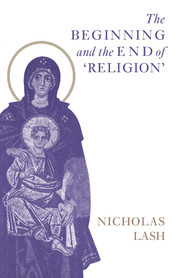Book contents
- Frontmatter
- Contents
- Preface
- PART ONE A MEETING-PLACE FOR TRUTH
- PART TWO EMERGING FROM MODERNITY
- 4 Observation, revelation and the posterity of Noah
- 5 On what kinds of things there are
- 6 Contemplation, metaphor and real knowledge
- 7 When did the theologians lose interest in theology?
- 8 Anselm seeking
- 9 Creation, courtesy and contemplation
- 10 Hollow centres and holy places
- 11 Hoping against hope, or Abraham's dilemma
- 12 Eagles and sheep: Christianity and the public order beyond modernity
- 13 Incarnation and determinate freedom
- 14 Beyond the end of history?
- List of works cited
- Index
11 - Hoping against hope, or Abraham's dilemma
Published online by Cambridge University Press: 05 March 2012
- Frontmatter
- Contents
- Preface
- PART ONE A MEETING-PLACE FOR TRUTH
- PART TWO EMERGING FROM MODERNITY
- 4 Observation, revelation and the posterity of Noah
- 5 On what kinds of things there are
- 6 Contemplation, metaphor and real knowledge
- 7 When did the theologians lose interest in theology?
- 8 Anselm seeking
- 9 Creation, courtesy and contemplation
- 10 Hollow centres and holy places
- 11 Hoping against hope, or Abraham's dilemma
- 12 Eagles and sheep: Christianity and the public order beyond modernity
- 13 Incarnation and determinate freedom
- 14 Beyond the end of history?
- List of works cited
- Index
Summary
THE END OF THE WORLD – AND THE THEOLOGIAN'S DIFFICULTIES
I have discovered that, while it is in order for educated people to contemplate the end of history, it is less acceptable to mention the end of the world (notwithstanding the extent to which these notions may be interchangeable). Thus, in September 1992, the London Observer carried an article, entitled ‘End of the world’, which began like this: ‘The end of the world is one of those features peculiar to primitive religions, e.g., Norse mythology and fundamentalist Christianity.’ When religious symbols are situated, as they tend to be these days, somewhere between the primitive and the private, it becomes difficult to see what useful contribution theology might make to the reinvention of our common future.
Some world is ending now: whether its death-knell was sounded with the demolition of the Berlin Wall, with Auschwitz or Hiroshima or Vietnam, or even with the outbreak of the First World War. And one name we have given to the world now ending is the ‘modern’ world – hence all the talk these days, whether in celebration or contempt, about ‘postmodernism’.
The centre of the modern world, the world invented in the seventeenth and eighteenth centuries, was the cool and reasonable market-place, the democratic parliament of ‘secularity’. In this space governed (so it was supposed) by argument and calculation and not by power or passion, religion's sole admission was as divine endorsement of the empire or the nation-state.
- Type
- Chapter
- Information
- The Beginning and the End of 'Religion' , pp. 199 - 218Publisher: Cambridge University PressPrint publication year: 1996



